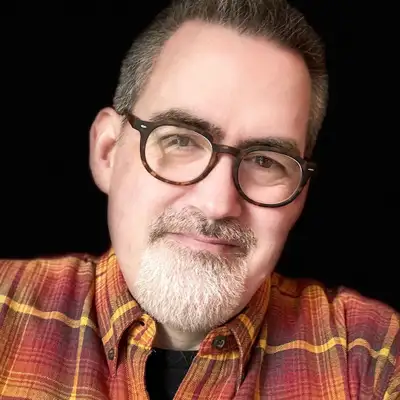A Detective Story Lost in the Florida Sun
- The film's relationship to 1970s political disillusionment and Watergate-era paranoia
- Comparisons to Chinatown and how both films handle moral ambiguity and incomplete understanding
- The problematic casting of 16-year-old Melanie Griffith and how the film handles her character's sexuality
- Arthur Penn's direction compared to his more celebrated works like Bonnie and Clyde
- The supporting cast including Harris Yulin, James Woods, and Susan Clark
- Michael Small's 1970s minimalist score and its effectiveness
- The significance of chess metaphors and Harry Mosby's tendency to replay famous games rather than create his own
- How the sun-drenched Florida setting subverts traditional noir visual conventions
- 🍿 Watch the Film: Apple TV | Amazon | Letterboxd
- 📽️ Original Theatrical Trailer
Creators and Guests

What is The Next Reel Film Podcast?
A show about movies and how they connect.
We love movies. We’ve been talking about them, one movie a week, since 2011. It’s a lot of movies, that’s true, but we’re passionate about origins and performance, directors and actors, themes and genres, and so much more. So join the community, and let’s hear about your favorite movies, too.
When the movie ends, our conversation begins.
I'm Pete Wright.
Pete Wright:And I'm Andy Nelson.
Pete Wright:Welcome to the next reel. When the movie ends
Pete Wright:Our conversation begins.
Pete Wright:Night moves is over.
Pete Wright:He'd a wood pile on the chance there's a snake in it. Hands down, best line of the movie. Andy, there's a chance that's the best line of any movie we've talked about this year.
Andy Nelson:Why do I have a feeling you're gonna now try to integrate that into every conversation you have?
Pete Wright:God. It's so good. It's just that good. Night Moves. Okay.
Pete Wright:I hadn't seen Night Moves. I hadn't seen it. Hackman. We like Hackman. Arthur Penn, Alan Sharp wrote it.
Pete Wright:Jennifer Warren. What happened to Jennifer Warren, man? I went into this movie with low expectations, thanks to you, because you said you didn't care for it that much the first time you saw it. I'm wondering if you changed your tune at all.
Andy Nelson:Yeah. This is, an interesting one to return to because, this this is what I wrote on Letterbox when I first watched this movie, which wasn't that long ago, September 2638. This is a frustrating watch. My understanding is that it's supposed to be frustrating as that's what the director Arthur Penn was going for, creating a detective story where everything is obfuscated, only revealed when our detective protagonist finds out. Even then though, the crime crimes end up being fairly nonsensical when the final credits start to roll.
Andy Nelson:I enjoyed the characters and the interesting seventies style relationships, but the story just didn't work for me. Two and a half stars, no heart.
Pete Wright:Here's the thing. I think I agree with your review, but I'd probably give it more stars. What how confusing is that? Well, and
Andy Nelson:that's, I think, where I landed this time. Like, in in the scope of noir, neo noir, I mean, I generally love noir stories, and this one certainly fits into that where the story is kind of nonsensical. And we'll talk about the plot a little bit because
Pete Wright:If we can.
Andy Nelson:I'm still like, who was actually involved in this? Like, how deep does it go? You know, and Arthur Penn is one of those directors who I feel like until he gets to the scenes of violence, you know, and I'm thinking of things like Bonnie and Clyde, which certainly has that that explosive ending, and here we also have a rather explosive ending, I feel like until he gets to those moments, he kind of is a TV director. Like, he's pretty boring as far as, like, his camera positions and his movements and everything. Like, I'm like, okay.
Andy Nelson:You're not overly exciting me with what you're doing here. And this is neo noir, and there's nothing about it as far as, like, playing with the shadows and darkness and the contrast and everything like that. It just feels pretty pretty dry. It's LA and it's Florida, so we're getting kind of even even in the sun baked elements of those two areas, even there, we're not getting anything that stood out too much. But still, I found myself enjoying it a lot more this time.
Pete Wright:I couldn't help but think about how would this movie have carried with other characters in it? Because the the actor, the cast carries so, so, so much. Hackman is so charismatic. Warren is great. Like, I I just really enjoy the performances.
Pete Wright:And a lesser cast, a less charismatic cast, I wonder how well they could have carried this the the plot, because I was interested in watching how these people were were interacting much more than I was interested in what they were doing. And I think that's a so I I wanna let's talk about first what we what we like about it because I I wanna celebrate what's good before we pull it apart. Can we do that? Can we'll start with Mosby. Harry Mosby.
Pete Wright:I like Harry Mosby a lot. He's much more bad monkey than he is Raymond Chandler. And you brought up the Florida thing. Like, this is a sun drenched detective story, not noir. I I don't I just don't I see the moody broodiness of the noir, I guess, but it just doesn't have the tone, as you rightly said.
Pete Wright:I really enjoy Harry Mosby. What do you think of the of the detective?
Andy Nelson:Well and I think a lot of that boils down to the fact that Gene Hackman was cast in the role. And I think he tapped into something incredibly dark and brooding and lost that we don't necessarily always get in what Arthur Penn's doing with the with the direction. But I love what what Hackman is doing here and the way that he, carries himself, presents himself. He's kind of this I mean, he himself is a little bit of as is so often in these noir stories, a little bit of a lost soul who, you know, had I I know we it's brought up quite a number of times how he was this big football star and everything. And it seems like he's still carrying that and never has been able to kind of reachieve any of the glory of his youth.
Andy Nelson:And now here he is working as a detective where he's just kind of unable to look at anything internal, and so all he does is fix other people's problems. Name's Andy, and I'm in the business of digging up the truth. That little taste you just heard, just the opening act of a story with more layers than a con man's alibi. You think you've got night moves figured out from five minutes? Think again, champ.
Andy Nelson:In this racket, the good stuff happens after hours behind closed doors where the amateurs can't follow. Membership gets you a backstage pass to the real show, monthly bonus episodes that cut deeper than a $2 shave, plus access to our other operations, Sitting in the Dark, CinemaScope, the film board, and movies we like. Consider it your license to kill, time, with the finest film discussion this side of Sunset Boulevard. Members get the uncut version, early ad free access without some sponsor Hawking's soap powder right when we're dissecting a character's moral decay. Sweet deal.
Andy Nelson:You vote on which films get the treatment next. In this game, knowledge is power, and power is everything. Our Discord? Think of it as the all night cafeteria where insomniacs and film obsessives trade theories over black coffee. Everyone's welcome, but members get the corner table where we really spill the secrets.
Andy Nelson:$5 a month buys you entry to this particular club, 55 annually if you're smart enough to plan ahead, and in my experience, the smart money always wins. Once you've heard our full night moves dissection, you'll understand why some conversations can only happen when the city's asleep and the neon signs are the only witnesses. Head to truestory.fm/join if you're ready to see how deep this rabbit hole goes. That's trust0ry.fm/join. The case files are waiting, and frankly, I could use someone with your particular interests.
Andy Nelson:Trust me on this one. I'm good at reading people.
